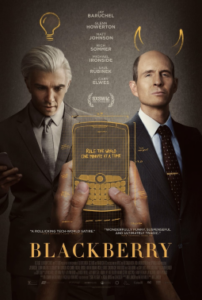The following comment is based exclusively on my impressions, hence it may be completely wrong… but it seems to me that the movie industry, in its insatiable demand for new content (not by chance, Netflix, Amazon or Apple are behind the films I’m about to mention), is becoming more interested in business stories. This year, for example, we had the formidable “Air”, a truly excellent movie that centered around the development of a product, the Nike Air Jordan, stripped of all romance and drama; “Tetris”, the very well told story of the intricacies and power plays behind the development of one of the world’s most famous games; “The Beanie Bubble”, on the eponymous stuffed animal, a more traditional story full of drama and strongly biased against “greed” (as virtually all business movies used to be). And now, “Blackberry”, by Matt Johnson.

I liked “Blackberry” a great deal. For one thing, it played the nostalgia effect, for me. I loved my blue Blackberry and I still miss it as the best cell phone I ever had. Not that my iPhone isn’t packaging together a great deal more things – but the Blackberry was all about e-mails, a by now outdated form of communication still dear to me vis-à-vis WhatsApp, Telegram, et cetera. Blackberry was fast, lean, and (but my memory may be tricking me) quite reliable.
The movie is mostly about business, in the sense that it does not indulge in the personal or love lives of the characters. That sometimes is important for the story, but sometimes is a trick played by screenwriters who just find business uninteresting. It is not the case of Matt Johnson.
I know very little about the story of Research in Motion, RIM, the company which made Blackberry. I finished the movie wanting to know more, which is a good sign.
The film focuses on mainly two figures: Matt Lazaridis, the brain behind Blackberry, and Jim Balsillie, the co-CEO with a business rather than a tech background. It could be seen as a suits vs geeks story. Screenwriters, but also viewers, tend to be biased in favour of the geeks. So I assumed Blackberry was, at least looking at the theatrical manifesto.
But it is a more balanced movie. The success of Blackberry is traced back to Lazaridis’ genial intuitions, both when it comes to the product itself and the way in which it interacted with the telecom network. But it is clear that the company would have never taken off, if it wasn’t for Balsillie imposing some business discipline on it. The Faustian bargain between being loyal to the nerdish original spirit and the quest for success (and profits) at the beginning pays off, but then it provokes a mutation of the geek Lazaridis into kind of a suit – which doesn’t work particularly well. I do not want to anticipate too much, but I found it telling that, though late and bad because he was distracted by personal matter, it is Balsillie who understood the change of the game with the iPhone. Lazaridis is now sacrificing him (for reasons you may remember, or go watch the movie) but moreover can’t hear him. He is enamored (as many genuine entrepreneurs are) with his business model and can’t contemplate an alternative one.
As I said, I do not know how accurate the movie is, and I would like to know. I suspect it exaggerated the precarious conditions of RIM before the launch of the Blackberry phone and presented its decline after the introduction of the iPhone as more tumultuous and quicker than it was. Yet I found it a decent description of the business world. It does not deny the existence of “pirates” and fraudsters (who could?) but tells a story in which a company is being truly innovative and generating value for customers and wealth for its founders. It also points out, in a rather neutral and intelligent way, that the tables may turn, and innovation is not necessarily path dependent. A new comer may arrive and revolutionize the market. Creative destruction doesn’t spare anyone.
Our understanding of the world we live in is shaped by stories, and in the times we live stories are mainly movies and TV series. How people “get” the market economy depends upon them more than anything else. So, I find good business movies a more promising and important signal than good best-sellers in economics (and no longer a rarer one, perhaps because best-seller in economics are now mainly carbon copies of old Marxist pamphlets).


READER COMMENTS
Steven J
Oct 18 2023 at 12:15pm
If you want to know more, I strongly recommend the 2015 book “Losing the Signal: The Untold Story Behind the Extraordinary Rise and Spectacular Fall of BlackBerry,” by Jacquie McNish and Sean Silcoff. It features a tight narrative, with lots of juicy details from interviews with the key players. I first read it shortly after it came out, and Wikipedia tells me that the movie is based on this book.
Alberto
Oct 18 2023 at 5:48pm
Thank you!
MarkW
Oct 18 2023 at 2:07pm
I suspect similar stories could be told about Nokia, Palm, and Microsoft (all big players in the early smartphone industry that were, like Blackberry, creatively destroyed by iPhone and Android).
One of the things that often bothers me about these stories is that they often are told as morality tales of blinkered corporate leaders who fail to recognize a revolutionary change in their industry. I think it is much more common that corporate leaders DO recognize the coming changes and even make serious attempts to respond, but ultimately find that their legacy organizations are incapable of the necessary major changes and competing successfully. Take Kodak, for example. Kodak *knew* very early that digital imaging, rather than film, paper, and processing were going to be the future. So Kodak was an early leader in both the digital sensor and digital camera business. But they hadn’t been much of an actual camera company for many decades — their specialty was film, paper, and chemicals. Ultimately, the actual camera companies (Canon, Nikon) won the digital business. But only temporarily — until smartphones and computational photography stole most of their non-professional camera business. And, in turn, Canon, Nikon, et al didn’t miss *that* boat because they didn’t see what was happening, but because they did not have the capability to become smartphone companies.
David
Oct 20 2023 at 7:39pm
You might like this review by an ex rim senior engineer, he discusses the way characters were changed to play up the drama. https://youtu.be/4yuqdr_1iRg?si=S2IlqjBa9zy6vY6i
Comments are closed.